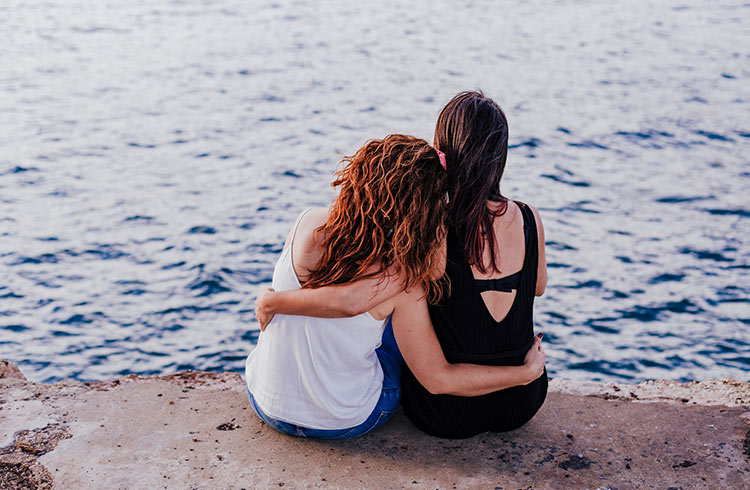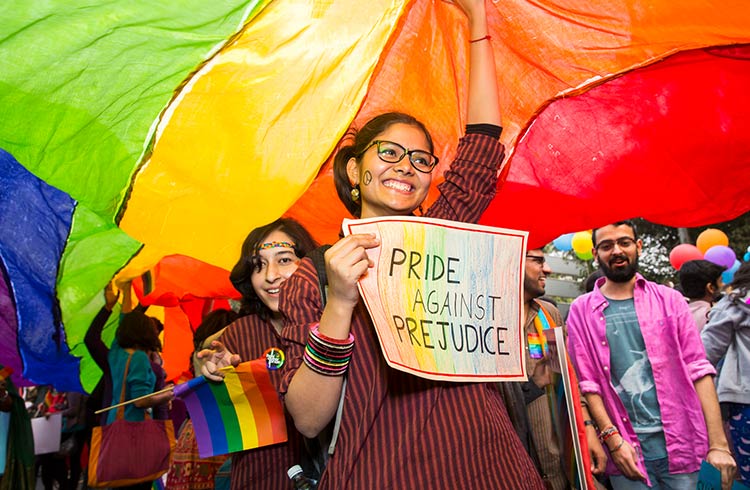6 Essential Travel Safety Tips for LGBTQ+ Couples
Marcie Bianco shares her top travel safety tips for lesbian, bisexual, and transgender women traveling together as a couple.
 Photo © Getty Images/Eva Blanco / EyeEm
Photo © Getty Images/Eva Blanco / EyeEm
With the rise of the female solo traveler, there has been a lot of discussion about women’s travel safety.
There may be an assumption, therefore, that traveling as a couple – non-sexual or romantic – would be safer for women. However, when lesbian, bisexual, and transgender women travel together, their sexuality is more visible to others than when they are traveling solo.
And this means that there are a host of concerns and considerations, from handling microaggressions to managing explicit discrimination, that LGBTQ+ couples need to negotiate while traveling.
Your travel experience with a romantic partner should be full of joy. You should be able to feel free and to indulge in shared new experiences; memories are made in the moments that you get to be together off the coast of Hawaii’s Big Island or exploring the architecture of a medieval castle in Austria. Traveling together is, for many couples, a fundamental component of sharing a life.
Traveling as an LGBTQ+ couple requires extra mental work and preparation. It is important to note, too, that the travel experience of queer female couples considerably varies based on the gender-presenting dynamic of the couple: two feminine-looking lesbians traveling as a couple will experience different microaggressions and biases than a couple where one or both women are masculine, or to the straight world, do not conform with what a stereotypical woman looks like (what is called masculine-of-center or gender-nonconforming).
Here are my travel safety tips that can help make your experience as a LBGQT+ traveler as smooth and enjoyable as possible.
- Know the law
- Research your accommodation
- Pinpoint LGBTQ+ hotspots
- Carry your identification
- Follow cultural cues
- Wield your wallet
1. Know the law
Travel preparation requires research, and not only about destinations, airfares, and activities. For an LGBTQ+ person traveling solo or with a partner, essential travel preparation includes researching laws on homosexuality.
According to the LGBTQ+ blog “76 Crimes,” currently 73 nations have laws that criminalize homosexuality. This includes, international legal organization Human Dignity Trust notes, “12 jurisdictions in which the death penalty is imposed or at least a possibility for private, consensual same-sex activity.” Furthermore, “15 jurisdictions criminalize the gender identity and/or expression of transgender people.”
The International Lesbian, Gay, Bisexual, Trans and Intersex Association (ILGA) is a terrific resource for researching destinations and their safety.
In addition to thinking about safety in this context, also think about the ethics of traveling to a destination that promotes hate against LGBTQ+ people. Do you really want to invest your money in the tourism of a nation that discriminates against you and your community?
2. Research your accommodation
After researching the law and deciding on a safe destination, pre-travel preparation should also include researching the LGBTQ+-friendless of accommodations. Because of the value of the so-called pink dollar, more and more hotels clearly present their LGBTQ+-friendliness on their website.
Another indicator is advertising: pick up a LGBTQ+ magazine, such as The Advocate or Curve, to see who is intentionally reaching out to the LGBTQ+ people, with the inherent promise of inclusiveness and friendliness. LGBTQ+ websites will more often than not include travel articles and guides that outline accommodation that welcomes the LGBTQ+ community. Likewise, pay attention to mainstream media and commercials and take stock of what types of couples are featured in the ads.
However, be advised that even accommodation that touts its LGBTQ+-friendliness might still present uncomfortable moments for LGBTQ+ couples. I cannot recount the number of times that hotel check-in has inquired about the room with the king-size bed that I had booked; “Just double-checking that you want only one bed,” they’d say, looking back and forth between myself and the female partner I was on holiday with.
Also annoying, and quite specific to lesbian couples, is being in a room with one tiny bottle of shampoo and one tiny bottle of conditioner. Two women with two heads of long hair need more than that!
Here, I cannot emphasize enough for LGBTQ+ couples to research LGBTQ+-owned accommodation and B&Bs in particular. A few years ago, my then-girlfriend and I stayed at a resort on the Costa del Sol in Spain, which was advertised as self-catering accommodation for lesbians and queer women. Not only did we feel safe but, because it was small and served a specific clientele, we made lifelong friends with other lesbians who were also staying there. That is, we didn’t have to go out to find other lesbians, our community was right there with us.
3. Pinpoint LGBTQ+ hotspots
If you’re not staying at an LGBTQ+-owned accommodation and are craving some community interaction, map out the bars, bookstores, and cafes that are LGBTQ+-owned and operated, or the ones that give strong queer vibes in their advertising, social media, or clientele.
Social media, in this regard, is extremely helpful in finding LGBTQ+ hotspots that can serve as beacons of safety, as well as providing opportunities for meeting locals and making friends and expanding your own queer community.
Another social media tip is to search out LGBTQ+ travel bloggers and journalists; they usually have websites or articles that outline the essential hotspots for “what to do” and “where to eat,” as well as LGBTQ+-specific annual events and activities to keep in mind when booking travel.
4. Carry your identification
Identification (ID) cards are necessary for any traveler, but they could be a matter of life-or-death if a traveler is trans, gender queer, or gender nonconforming. Even though the process is long and arduous, before setting off on your journey make sure that your passport and driver’s license match your gender identity. This will also ensure that the visa process, if the destination requires one, goes as smoothly and seamlessly as possible.
Make a copy of your ID cards and give it to your partner, so that if something happens to you or you were unable to access your own personal information, they would have a copy of your information.
Always carry your ID cards, you never know when you’ll need it. For example, once, when entering a mosque Turkey, my then-girlfriend was placed in the men’s entrance line, while I was pushed ahead in the women’s entrance line. Here is where an ID card can prevent such a mishap.
5. Follow cultural cues
In some places, especially where homosexuality and gay marriage are legal, being out with your partner feels safe. In these cases, it is probably safer to speak up when encountering some microaggression or bias.
In places where homosexuality is legal but less tolerated, it might be smarter to leave people guessing about your relationship. The advice, here, isn’t to “go into the closet” or “deny who you are.” Rather, it’s “have some common sense about your surroundings.” If you’re at a restaurant, feel the energy of the room, and if you get a sense of negativity being directed your way, and if people are staring or glaring. If this is the case, but you still want to eat there, maybe you agree that you can forego canoodling over candlelight at your table for an hour or so.
Following cultural cues also demands you and your partner to be on the same page. This requires you and your partner to understand your plan for responding to any unforeseen negative circumstances, for example, if someone accosts or verbally abuses you. It is often safer to disengage. If, for example, you’re stuck on a boat trip and can’t get off to get away from homophobic passengers, try find a secluded part of the ship, or take advantage of the on-shore excursions.
6. Wield your wallet
Being ignored or rudely treated? Leave. Do not pay. If you pre-paid, report the situation to management and, with a measured voice, write a review of your experience on Yelp, or on social media. This isn’t so much to shame an entity more than it is to make homophobia visible to other travelers. Airlines have been called out and are now more attentive to LGBTQ+ discrimination.
Related articles
Simple and flexible travel insurance
You can buy at home or while traveling, and claim online from anywhere in the world. With 150+ adventure activities covered and 24/7 emergency assistance.
Get a quote

No Comments